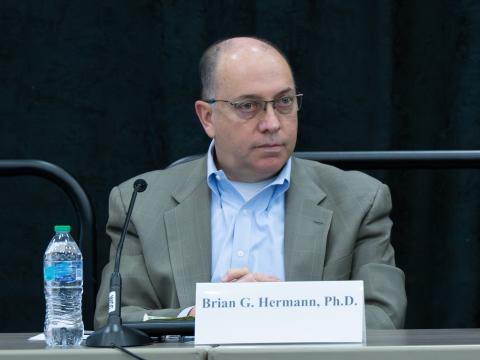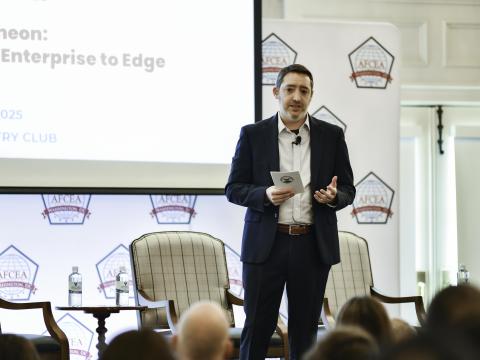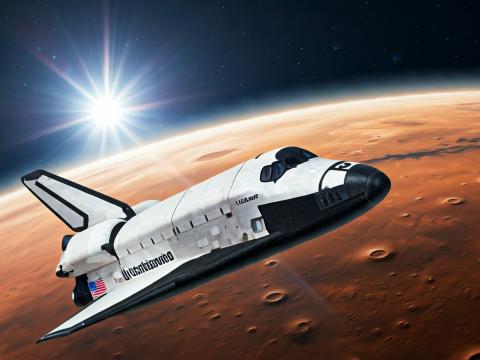Company Rebuilds From the Ashes of the Wireless Industry
 |
The Hummer belonging to Eric DeMarco, chief executive officer (CEO) of Kratos Defense & Security Solutions, speaks volumes about both the company and its leader. |
Eric DeMarco knows how to cut a wide swath through the Southern California defense community. He just jumps in the corporate car and tools around town.
And, for that, he has quite an attention-getting device. DeMarco likes to drive a big white Hummer equipped with aggressive-looking oversized tires and a deluxe suspension system that makes the car look three feet taller. Then there are the graphics—a giant American eagle is hitching a ride on a missile in flight, and it wears an expression as if this is the thrill of a lifetime. The passenger door and rear of the car are emblazoned with his company’s name—Kratos—in huge letters. The driver’s door is splattered with the rest of the corporate logo—Defense & Security Solutions.
And, DeMarco says, “Why not?” After all, Kratos was the Greek god of strength and power.
For DeMarco, the company’s 47-year-old chief executive officer (CEO), the Hummer is more than just free advertising. A native of suburban San Diego, where the defense electronics and technology firm is headquartered, DeMarco grew up loving bold cars.
Some would say that as head of Kratos, he is driving the corporate version of a speed machine. Indeed, after a dizzying round of acquisitions and new product introductions, DeMarco has pulled off what clearly ranks as one of the more successful corporate turnarounds in the entire defense industry.
A company with roughly $750 million in sales, Kratos recently won two awards for its success with mergers and acquisitions. In 2009, DeMarco won an award for the skill he showed in restructuring a company that was deeply troubled and in a completely different industry just a few years ago. But, the former collegiate running star prefers to give the credit to others.
“I specifically want to say we are very fortunate that we have a wonderful team here,” DeMarco explains. “This company has some of the best people in the industry. It’s because of them that we have been so successful.
“We’re also blessed with an incredible group of shareholders. We’ve known the vast majority of them for many years, as well as our stakeholders on the bond side. They know our strategy is to build the next great pure-play national security company.”
In addition to these workers and supporters, DeMarco’s father, Vincent, lends a hand now and again. In fact, DeMarco says his father’s insights as an electronic warfare executive proved invaluable when it came time for Kratos to make its crowning acquisition—the $270 million purchase of Herley Industries Incorporated.
“I talk to my dad every day,” DeMarco says. “He’s my best friend. He knows Herley’s products cold. He told me they were a wonderful company with wonderful products. He absolutely helped me.”
Based in Pennsylvania, Herley has 45 years of history supplying sophisticated radio frequency, microwave and millimeter-wave components and subsystems to the defense and aerospace industries. Herley also provides systems for avionics, radar, communications, electronic warfare and target control.
As does Kratos, Herley focuses heavily on U.S. Defense Department and related contracts. The Pentagon, Northrop Grumman and Lockheed Martin account for about half of sales. Other key clients include BAE Systems, Boeing, General Dynamics, Harris Corporation and Thales.
On paper at least, the merger would seem to be a great fit. Heavily focused on high-margin products, Kratos has a wide range of defense hardware contracts and has made formidable moves into information technology and cybersecurity.
Kratos recently announced that a team it leads won a multiyear award with an undisclosed national security client valued at $750 million. If all options are exercised, the program could generate total team sales of $1 billion.
The company has awards to help the Navy with directed-energy weapons as well as contracts for command and control; unmanned systems; and command, control, communications, computers, intelligence, surveillance and reconnaissance (C4ISR). Through a previous merger, Kratos also is approved to bid on the sprawling 10-year, $50 billion Alliant program that spans the federal government.
Before the March merger with Herley, both companies were publicly traded. The two firms were about the same size. Herley’s market cap, the total value of its stock, stood at about $266 million. Kratos had a market cap of about $260 million, which is now roughly 25 percent larger.
But those statistics greatly understate the rapid rise of Kratos under DeMarco. When he joined the company in 2003, it was a struggling wireless infrastructure firm that had been slaughtered in the dot.com crash, from which it never really recovered.
At the time, the company, then called Wireless Facilities Incorporated, did not have a single federal contract, let alone any defense sales. Its stock once commanded $162 a share, but it fell to below $1.
In 2009, Kratos underwent a reverse stock split that significantly reduced the number of shares outstanding and helped it become what financial analysts call “institutional” grade. Professional investors generally will not touch a stock below $10. After the split, shares traded above $8, and they have gained 70 percent in value since then.
DeMarco says he knew the company faced challenges when he joined, but he had no idea how deeply troubled it was. Within months, however, a brutal industry shakeout took its toll—and he quickly changed gears.
“That business got commoditized overnight,” he says. “Gross margins went from 45 percent to around 10 percent. Our diversification strategy turned into a transformation strategy. We had to sell assets. In 2005, 2006 and 2007, we sold $500 million worth of wireless business.
“So, we basically switched out the engines on a 747 in the air. We still have about $220 million of net operating losses [on the books] today. That’s how much that business lost. We’re effectively 30 to 35 percent more cash flow profitable than our peers because we don’t pay any federal taxes.”
For now at least, DeMarco says Kratos will focus on integrating Herley and the other four companies it has acquired over roughly the past 18 months. That means the merger frenzy will subside as Kratos targets higher profit margins in what may be a tough Pentagon budget climate. But Kratos still may make some acquisitions along the way.
“Of course, if opportunities present themselves, we’ll have to give them serious consideration,” DeMarco adds.
In 2010, with no Herley business on the books, Kratos registered a 22 percent sales increase to $408.5 million. It reported net income of $39.7 million, a 9.7 percent increase from 2009.
But DeMarco expects annual sales growth to level off at about five percent after this year. Meanwhile, he has plenty of existing contracts to keep him busy. In October 2010, a subsidiary landed the company’s largest contract to date—an award to support the U.S. Missile Defense Agency that could be worth up to $1.6 billion.
Once the program hits its stride, it could generate as much as $100 million in annual sales. The award had its genesis nearly two years ago when the executive team decided it would win a Missile Defense Agency Engineering and Support Services (MiDAESS) prime contract, and it was so determined it even bought a company in the sector to improve its odds.
All this momentum raises an obvious question: Now that Kratos has reached critical mass, can it remain independent?
“We absolutely have had inquiries over the past four months” about selling, DeMarco says. “This is not my company. I own about three percent of it, but it belongs to the stockholders. If we get a market offer that makes sense, I will bring it to them. If they want to do it, then we’ll sell the company.”
For his part, DeMarco seems to take all the success in stride. Then again, he instinctively knows that with Kratos, he is running a marathon, which seems to come naturally.
He attended the University of New Hampshire on two scholarships: one academic and the other for long-distance running. To this day, he still loves to jog and says he puts in eight to 10 miles a day. Maybe that is why he sounds so nonplussed when he looks back on his Kratos career.
“I am not a turnaround guy,” he concludes. “But that was the hand I was dealt. I made a commitment to the board, to the shareholders, and there was no way I could leave them. So, we took the cards we had and we played them the best we could.”
In turn, this harkens back to his love of powerful vehicles. DeMarco recalled the joy he felt as a teenager driving and working on his V-8-powered classic 1969 Camaro Z-28. Sleek and responsive, the car had a high-performance engine and four-speed manual transmission just made for crisp shifting. No wonder DeMarco found it hard to obey the posted speed limits.
“I built race cars,” he explains. “I street-raced hot rods, muscle cars. I loved it.”




Comments